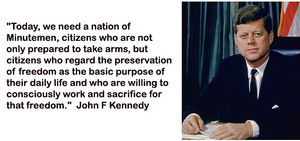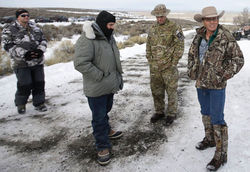Militia: Difference between revisions
No edit summary |
No edit summary |
||
| Line 1: | Line 1: | ||
| Line 11: | Line 9: | ||
"The Second Amendment has most recently been interpreted to grant the right of gun ownership to individuals for purposes that include self-defense. At first it was thought to apply only to the Federal government, but through the mechanism of the Fourteenth Amendment, it has been applied to the states as well." https://www.law.cornell.edu/constitution/second_amendment | "The Second Amendment has most recently been interpreted to grant the right of gun ownership to individuals for purposes that include self-defense. At first it was thought to apply only to the Federal government, but through the mechanism of the Fourteenth Amendment, it has been applied to the states as well." https://www.law.cornell.edu/constitution/second_amendment | ||
: So what this is saying is that without the Fourteenth Amendment the second amendment has nothing to do with the average American who was [[Not a party|not a party]] to the [[CCC|Constitution]]. | |||
: "MILI'TIA, noun [Latin from miles, a soldier; Gr. war, to fight, combat, contention. The primary sense of fighting is to strive, struggle, drive, or to strike, to beat, Eng. moil, Latin molior; Heb. to labor or toil.] The body of soldiers in a state enrolled for discipline, but not engaged in actual service except in emergencies; as distinguished from regular troops, whose sole occupation is war or military service. The militia of a country are the able bodied men organized into companies, regiments and brigades, with officers of all grades, and required by law to attend military exercises on certain days only, but at other times left to pursue their usual occupations." Webster's Dictionary 1828 - Online Edition | : "MILI'TIA, noun [Latin from miles, a soldier; Gr. war, to fight, combat, contention. The primary sense of fighting is to strive, struggle, drive, or to strike, to beat, Eng. moil, Latin molior; Heb. to labor or toil.] The body of soldiers in a state enrolled for discipline, but not engaged in actual service except in emergencies; as distinguished from regular troops, whose sole occupation is war or military service. The militia of a country are the able bodied men organized into companies, regiments and brigades, with officers of all grades, and required by law to attend military exercises on certain days only, but at other times left to pursue their usual occupations." Webster's Dictionary 1828 - Online Edition | ||
| Line 17: | Line 17: | ||
: Antonyms: unregulated - not regulated; not subject to rule or discipline; "unregulated off-shore fishing" | : Antonyms: unregulated - not regulated; not subject to rule or discipline; "unregulated off-shore fishing" | ||
:2. regulated - marked by system or regularity or discipline; "a quiet ordered house"; "an orderly universe"; "a well regulated life" | :2. regulated - marked by system or regularity or discipline; "a quiet ordered house"; "an orderly universe"; "a well regulated life" | ||
Synonyms: ordered, orderly. | Synonyms: ordered, orderly. Word Net Dictionary | ||
== The U.S. Code == | |||
10 U.S. Code Chapter 13 - THE MILITIA '''§ 311 - Militia: composition and classes''' | |||
Title 10 U.S. Code Chapter 13 - THE MILITIA '''§ 311 - Militia: composition and classes''' | |||
: (a) The militia of the United States consists of all able-bodied males at least 17 years of age and, except as provided in section 313 of title 32, under 45 years of age who are, or who have made a declaration of intention to become, citizens of the United States and of female citizens of the United States who are members of the National Guard. | : (a) The militia of the United States consists of all able-bodied males at least 17 years of age and, except as provided in section 313 of title 32, under 45 years of age who are, or who have made a declaration of intention to become, citizens of the United States and of female citizens of the United States who are members of the National Guard. | ||
: (b) The classes of the militia are— | : (b) The classes of the militia are— | ||
| Line 27: | Line 29: | ||
:: 2) the unorganized militia, which consists of the members of the militia who are not members of the National Guard or the Naval Militia. | :: 2) the unorganized militia, which consists of the members of the militia who are not members of the National Guard or the Naval Militia. | ||
10 U.S. Code '''§ 312 - Militia duty: exemptions''' | Title 10 U.S. Code '''§ 312 - Militia duty: exemptions''' | ||
: (a) The following persons are exempt from militia duty: | : (a) The following persons are exempt from militia duty: | ||
:: (1) The Vice President. | :: (1) The Vice President. | ||
| Line 41: | Line 43: | ||
[[File:kennedy.jpg|right|300px]] | [[File:kennedy.jpg|right|300px]] | ||
*"Today, we need a nation of Minutemen, citizens who are not only prepared to take arms, but citizens who regard the preservation of freedom as the basic purpose of their daily life and who are willing to consciously work and sacrifice for that freedom." | *"Today, we need a nation of Minutemen, citizens who are not only prepared to take arms, but citizens who regard the preservation of freedom as the basic purpose of their daily life and who are willing to consciously work and sacrifice for that freedom." | ||
John F. Kennedy, the 35th President of the United States from January 1961 until his assassination in November 1963 | |||
{{Template:Law}} | {{Template:Law}} | ||
[[File:protestors.jpg|right|250px|thumb|These are not "dangerous", "anti-government", "militant", "outsiders" but Americans protesting abuse by federal agencies that have from time to time over stepped their authority and damaged the lives and property of good law abiding Americans.]] | |||
I am moving the bulk of this article to the [[The Occupy Refuge Movement]] because this is not much different than the '''Occupy Wall Street Movement''' when you really look at what is happening and the reason these [[Constitutional]]ist are acting. You can also find detailed information about the [[Hammond]] situation at our webpage [[Hammond|here]]. | |||
{{Template:Land issues}} | |||
Revision as of 00:14, 24 March 2016
Who is the Militia
Amendment II
"A well regulated militia, being necessary to the security of a free state, the right of the people to keep and bear arms, shall not be infringed."
"The Second Amendment has most recently been interpreted to grant the right of gun ownership to individuals for purposes that include self-defense. At first it was thought to apply only to the Federal government, but through the mechanism of the Fourteenth Amendment, it has been applied to the states as well." https://www.law.cornell.edu/constitution/second_amendment
- So what this is saying is that without the Fourteenth Amendment the second amendment has nothing to do with the average American who was not a party to the Constitution.
- "MILI'TIA, noun [Latin from miles, a soldier; Gr. war, to fight, combat, contention. The primary sense of fighting is to strive, struggle, drive, or to strike, to beat, Eng. moil, Latin molior; Heb. to labor or toil.] The body of soldiers in a state enrolled for discipline, but not engaged in actual service except in emergencies; as distinguished from regular troops, whose sole occupation is war or military service. The militia of a country are the able bodied men organized into companies, regiments and brigades, with officers of all grades, and required by law to attend military exercises on certain days only, but at other times left to pursue their usual occupations." Webster's Dictionary 1828 - Online Edition
- 1. regulated - controlled or governed according to rule or principle or law; "well regulated industries"; "houses with regulated temperature"
- Antonyms: unregulated - not regulated; not subject to rule or discipline; "unregulated off-shore fishing"
- 2. regulated - marked by system or regularity or discipline; "a quiet ordered house"; "an orderly universe"; "a well regulated life"
Synonyms: ordered, orderly. Word Net Dictionary
The U.S. Code
Title 10 U.S. Code Chapter 13 - THE MILITIA § 311 - Militia: composition and classes
- (a) The militia of the United States consists of all able-bodied males at least 17 years of age and, except as provided in section 313 of title 32, under 45 years of age who are, or who have made a declaration of intention to become, citizens of the United States and of female citizens of the United States who are members of the National Guard.
- (b) The classes of the militia are—
- (1) the organized militia, which consists of the National Guard and the Naval Militia; and
- 2) the unorganized militia, which consists of the members of the militia who are not members of the National Guard or the Naval Militia.
Title 10 U.S. Code § 312 - Militia duty: exemptions
- (a) The following persons are exempt from militia duty:
- (1) The Vice President.
- (2) The judicial and executive officers of the United States, the several States, the Commonwealth of Puerto Rico, Guam, and the Virgin Islands.
- (3) Members of the armed forces, except members who are not on active duty.
- (4) Customhouse clerks.
- (5) Persons employed by the United States in the transmission of mail.
- (6) Workmen employed in armories, arsenals, and naval shipyards of the United States.
- (7) Pilots on navigable waters.
- (8) Mariners in the sea service of a citizen of, or a merchant in, the United States.
- (b) A person who claims exemption because of religious belief is exempt from militia duty in a combatant capacity, if the conscientious holding of that belief is established under such regulations as the President may prescribe. However, such a person is not exempt from militia duty that the President determines to be noncombatant.

- "Today, we need a nation of Minutemen, citizens who are not only prepared to take arms, but citizens who regard the preservation of freedom as the basic purpose of their daily life and who are willing to consciously work and sacrifice for that freedom."
John F. Kennedy, the 35th President of the United States from January 1961 until his assassination in November 1963
Law
Law |
Natural Law |
Legal title |
Common Law |
Fiction of law |
Stare decisis |
Jury |
Voir dire |
Consent |
Contract |
Parental contract |
Government |
Civil law |
Civil Rights |
Civil Government |
Governments |
No Kings |
Canon law |
Cities of refuge |
Levites |
Citizen |
Equity |
The Ten Laws |
Law of the Maat |
Bastiat's The Law and Two Trees |
Trees |
The Occupy Refuge Movement |
Clive Bundy |
Hammond |
Barcroft |
Benefactors |
Gods |
Jury |
Sanhedrin |
Protection |
Weightier matters |
Social contract |
Community Law |
Perfect law of liberty |
Power to change |
Covet |
Rights |
Anarchist |
Agorism |
Live as if the state does not exist |

I am moving the bulk of this article to the The Occupy Refuge Movement because this is not much different than the Occupy Wall Street Movement when you really look at what is happening and the reason these Constitutionalist are acting. You can also find detailed information about the Hammond situation at our webpage here.
Road closings |
Hage |
Hammond |
Clive Bundy |
Robert LaVoy Finicum |
The Occupy Refuge Movement |
BLM |
Legal title |
Water |
Good men |
Fraud |
False religion |
Dialectic |
Judge Anna |
Network |